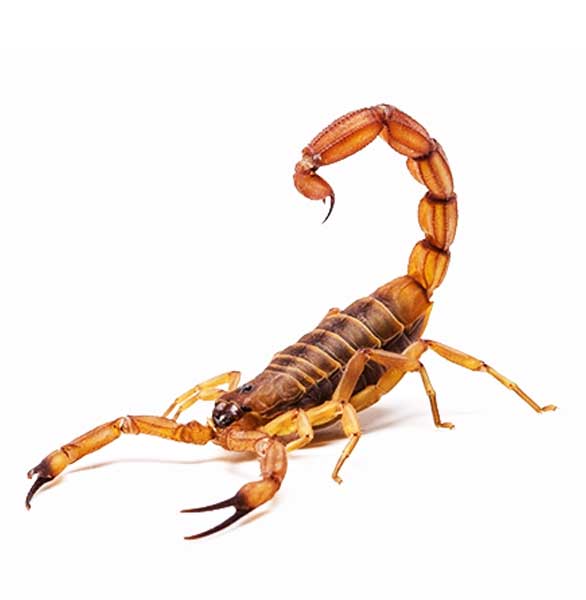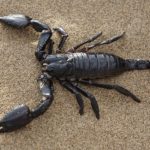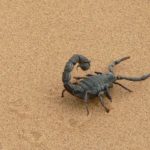WELCOME TO OUR Scorpion LEARNING CENTER
ScorpionsScorpions are arachnids that have eight legs just like spiders. They are also related to ticks and mites. Scorpions are the oldest known arthropods on the planet. They are aggressive insects that can shoot venom from their tail thanks to their two venom glands. There are more than 2,500 species of scorpions.
(Arachnida Scorpiones)
Description
Scorpions have pincers and a thin, segmented tail that curves over their back, making them look like small lobsters. At the end of this tail is a stinger. They have four pairs of legs.
The body of a scorpion is divided into three parts:
- The prosoma or cephalothorax (head)
- The mesosoma (abdomen)
- The metasoma (tail)
The prosoma has two eyes on top as well two to five eyes along each side (as many as five pairs). So while a scorpion may have up to a dozen eyes, they still can’t see very well. Instead, they use sensory structures in their legs to get around.
While scorpions do not have bones, they do have an exoskeleton made of chitin, which is like a shrimp shell. They can range in color from yellow to brown to red to black. They can be up to 5 inches long.

Additional Information
Habits & Behavior
 Most scorpions tend to be nonsocial, solitary animals. They only interact with each other at birth and during courtship. They are so aggressive that they will eat other scorpions in their presence, giving them the nickname “inveterate cannibals.” While some scorpions may be social, this is rare.
Most scorpions tend to be nonsocial, solitary animals. They only interact with each other at birth and during courtship. They are so aggressive that they will eat other scorpions in their presence, giving them the nickname “inveterate cannibals.” While some scorpions may be social, this is rare.
All scorpions are venomous — even babies. They can inject you with the same amount of venom as adults. They use their venom for self-defense to paralyze and kill their prey.
Most scorpions live in the desert. They can also be found in grasslands and forests, as well as inside caves.
Many scorpions live in burrows they dig themselves or claim from other wildlife. They use these burrows to hide from predators. The burrows are typically small and snug. Scorpions may also climb trees.
Scorpions will stay in the same area their entire lives. They can hibernate during the winter and withstand starvation for up to 12 months at a time. Scorpions are nocturnal and can live 3-5 years on average.
Food
Scorpions eat a variety of insects, spiders, centipedes, lizards, snakes, and even other scorpions. They will also eat small mammals, such as mice. If scorpions have enough water to drink, they can survive for months without food. They play an important role in their ecosystem by keeping insect populations low.
Scorpions use their pincers to capture and crush prey. However, they have a very tiny mouth and cannot chew their food. They can only suck up liquid, so the prey they catch is mashed up and bathed in enzymes to dissolve the prey. This is a lengthy process that can take up to an hour. While scorpions don’t need to eat every day, they usually find a meal at least every 2-3 weeks.
Reproduction
Scorpions reproduce in a unique way. The male and female grasp each other’s pincers and dance while the male attempts to move the female onto his sperm packet, called a spermatophore. The female then pushes the packet into her genital opening. The male will leave right away, before the female decides to eat him. All known scorpion species give live birth and the female cares for the young as their exoskeletons harden, transporting them on her back.
A scorpion may give birth to anywhere from one to 105 babies over a period of several weeks. Most scorpions mature at around 6 months of age, although some species may not mature until they are several years old.
Signs
Do you have scorpions in or around your home? Here are the signs:
- You’ve seen a scorpion. This is the most obvious sign. While many scorpions are loners, if you see one, it’s possible there could be many others nearby. Some have families hiding around the yard, so be wary of an infestation.
- You’ve seen a lot of smaller bugs. Scorpions go where the food is. They enjoy eating smaller insects, so if you’ve seen beetles, spiders, and other little bugs in your garden, scorpions may not be far behind.
- You have citrus trees. While scorpions tend to live in the desert, the bark scorpion is often found near citrus trees. These trees provide shade as well as the perfect place for them to hide. If you have citrus trees in your backyard, you might have a scorpion infestation.
Dangers
Scorpions are often seen as dangerous due to the fact that they produce venom and will use it when frightened. However, the truth is that most scorpion species do not seriously threaten humans. In fact, healthy adults do not typically need medical treatment after a sting. While all scorpions are venomous, their venom varies greatly in potency.
 Only 25 species of scorpions have venom capable of killing a human. This often happens in areas where there is a lack of medical treatment. In the United States, the bark scorpion is the only scorpion species with venom potent enough to cause severe symptoms. It is found mainly in deserts in the Southwest. A scorpion sting can be swollen and painful, though. Young children and older adults are most likely to suffer serious complications.
Only 25 species of scorpions have venom capable of killing a human. This often happens in areas where there is a lack of medical treatment. In the United States, the bark scorpion is the only scorpion species with venom potent enough to cause severe symptoms. It is found mainly in deserts in the Southwest. A scorpion sting can be swollen and painful, though. Young children and older adults are most likely to suffer serious complications.
A scorpion sting can cause the following symptoms:
- A stinging or burning sensation at the injection site
- Pain when touched
- Muscle twitches
- Abdominal pain and cramps
- Restlessness
- Convulsions
- Thick tongue sensation
- Slurred speech
- Drooling
- Respiratory depression
Contact Us Today
Scorpions are attracted to homes and yards where there is plentiful food. If your home is attractive to these pests, seek professional Austin pest control right away before the problem gets worse.
While store-bought sprays can be an option, why not get rid of scorpions once and for all? Stride Pest Control can provide you with solutions to get rid of infestations of scorpions and other pests. We’re known as the best of the best, and our testimonials and reviews prove it. Learn more by scheduling a free inspection. Call 512) 777-1339 (Austin) or (210) 547-8410 (San Antonio) or fill out the online form.
Number of possible babies in a single brood
100
Months a scorpion can go without eating
4-5
Average years a scorpion will live
3-5
Number of legs a scorpion has
8
GET A FREE CONSULTATION TODAY!
Get a FREE Consultation

